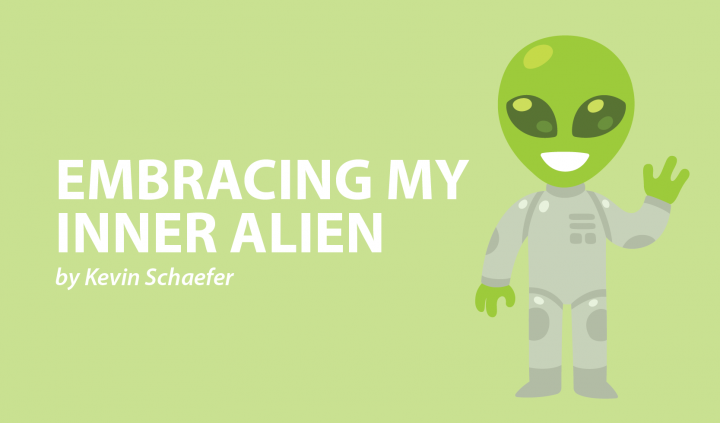Finding Comfort in the Absurd
Written by |

Between frequent migraines, sleep deprivation, losing significant strength in my arm and upper body, and the universal growing pains of being a teenager, my high school experience came with plenty of challenges. There was also that time I mustered the courage to ask a girl out, only to find that she already had a boyfriend.
Yet amid my teenage idiosyncrasies and struggles with confronting the progressive aspect of my disability, there was a particular form of escapism in which I found comfort: absurdity.
A key part of my high school routine was coming home every day to watch “The Office,” with a bag of popcorn and a coke in front of me. No matter how stressed I was about school or my health, I found solace in seeing the adventures of Michael Scott and the staff of Dunder Mifflin Inc. play out. Whether it was the episode where Michael is tasked with pushing the father of the bride’s wheelchair down the aisle in “Phyllis’ Wedding,” or when an incident with Meredith prompts Michael to launch a “cure for rabies” fundraiser in “Fun Run,” this show and these characters helped me forget about my troubles for a little while.
It wasn’t all about escapism though. Shows like “The Office,” and other pieces of comedy that I religiously devoured, taught me to embrace the absurdities of life as they came to me. I began to recognize the situations that were outside of my control, and instead of wallowing in self-pity, I developed an appreciation for the unexpected chaos around me.
Case in point: family vacations, broken bones, working with caregivers, relying on strangers for help, and even losing brothers and sisters in the SMA community. There was no way to prepare myself for any of these scenarios, so at a certain point, I decided to accept them and to keep rolling on.
The more I laughed at the ridiculousness of the things around me and embraced the absurd, the more I developed a Zen-like mindset. By the time I got to college and into my early 20s, I was so used to things not working out as I’d planned, that I had developed the ability to remain calm in stressful situations.
A few days ago, a stomach virus infected my family members and me in rapid succession. My 2-year-old niece got it first on a Saturday morning, and it spread to the rest of us throughout the week. Thursday came and I still hadn’t felt anything; I was hoping that I might avoid this bug. Imagine that: The disabled guy is the only one who’s not sick.
Sure enough, though, the inevitable storm came later that night as I sat on the toilet. I spent the next few hours in a seemingly endless whirl of vomit and diarrhea. Neither of these activities is particularly fun, but they’re a little more manageable when they happen one at a time. Unfortunately, I did not have that luxury in this situation.
Thinking quickly, I had my dad put a table in front of me, stack a bunch of towels on top of it, and then place a bucket on top of the towels so that it was directly in front of me. This way I had something to throw up into, and I could still allow the lower part of my body to do its thing.
“Multitasking!” I thought to myself.
The virus came and went, and I was back to “normal” by the weekend. I may not have been enthusiastic about this scenario or the countless other obstacles that my disability has presented me with throughout my life, but I managed. I sucked it up, laughed, and streamed a few episodes of “The Office” the following day while I recuperated. Living with SMA requires me to face the abnormally disjointed music around me, and to embrace it.
***
Note: SMA News Today is strictly a news and information website about the disease. It does not provide medical advice, diagnosis, or treatment. This content is not intended to be a substitute for professional medical advice, diagnosis, or treatment. Always seek the advice of your physician or other qualified health provider with any questions you may have regarding a medical condition. Never disregard professional medical advice or delay in seeking it because of something you have read on this website. The opinions expressed in this column are not those of SMA News Today, or its parent company, Bionews Services, and are intended to spark discussion about issues pertaining to spinal muscular atrophy.








Leave a comment
Fill in the required fields to post. Your email address will not be published.